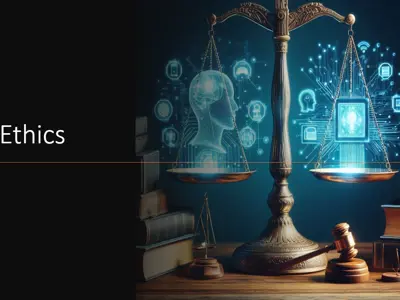Artificial Intelligence (AI) at KPRDSB

Our Approach to AI
Artificial Intelligence (AI) holds the promise of revolutionizing education. It offers new opportunities to be innovative with respect to student learning, enhance student achievement, and support the well-being of both staff and students.
When implemented correctly, AI can positively impact every student and staff member within our board. We believe that:
- Every student and staff member should have access to AI tools.
- We have a duty to teach AI literacy to students, equipping them with the skills needed to navigate today's world.
- We acknowledge the risks associated with AI and are committed to mitigating them by following our AI Guiding Principles and promoting critical thinking skills among all staff and students when using AI tools.
KPRDSB AI Guiding Principles
Prioritize Humane & Ethical Use
A key priority in the KPRDSB is the humane and ethical use of AI (and all technology). AI has to be used for good – not for cheating, deepfakes, or scams. We want our students to make ethical decisions that align with Boards values and focus on the dignity of all.
Focus on Education & Learning
We are incorporating AI in our classrooms because we strongly believe that it will help students learn, help our educators teach, and empower students to guide their own learning. AI gives us an opportunity to innovate student learning and improve our learning environment.
Champion Equity & Justice
We know that generative AI can have inherent biases and the potential for hallucinations and incorrect information. We need to educate our students to be aware of this when assessing AI output to ensure it respects and reflects the identities and cultures in our community.
Be Transparent
As a Board, we will indicate and teach our students to indicate when AI has been used to assist in creating a body of work. When the use of AI is approved in student work, students will be expected to be clear and honest about AI’s role in the work and properly cite its use.
Safeguard Privacy, Security & Data Protection
Any AI tools that we provide for students or staff on our portals will have undergone a privacy impact assessment. We have also created a framework for staff to evaluate additional AI tools not on our portal to ensure they adequately protect student and staff privacy and data.

Ethical Considerations
In formulating our guidelines for AI and Generative AI (GenAI), it is crucial to anchor our ethical considerations in our existing KPRDSB teaching and learning practices. We acknowledge that certain situations will inherently be inappropriate, and in these instances, we do not require AI guidance to discern this. Conversely, there will be scenarios perfectly aligned with our educational values, promoting student development and societal functioning. These can be thought of as ‘red and green light situations,’ where the former represents clear ethical breaches, and the latter, instances wholly compatible with our values.
Before using GenAI tools, users must carefully consider, understand, and adjust their use to protect both the privacy of themselves and others, as well as ensure ethical and legal use. GenAI tools can present inaccurate results that may be biased.
GenAI can produce misinformation and hallucinations. The large sets of data used by GenAI tools have made it easier to create content that is often indistinguishable from that produced by humans. Because these models are calibrated to create original content, inaccurate outputs are possible.

Safety, Security, and Privacy Considerations
Before individuals engage in using GenAI tools, safety, security, and privacy need to be at the forefront. Some tools may not meet the safety and privacy standards outlined by governance, oversight, or third parties who assist with compliance reviews, or KPRDSB’s existing policies. This encompasses terms of use, data collection, consent, and use and sharing of information that has been inputted into the tool. Privacy rights are engaged when we are dealing with personal information. Personal information is defined as anything that can identify a specific individual, such as name, student number, or even in some cases an IP address. Depending on the tool, the information that has been submitted can be used to further train it and be shared with other users. This can result in privacy breaches, misuse, and misinformation.

Pedagogical and Instructional Considerations
When educators design learning through the Deep Learning framework, Generative AI can act as a co-designer—enhancing digital fluency, supporting equitable access, and fostering the development of transferable skills that prepare all learners to thrive in a rapidly evolving world. When students are engaged in Deep Learning that addresses real-world problems, seeks creative and innovative solutions, and engage in a feedback loop with learning partners, they are engaged and have a voice that translates to powerful collaborative learning experiences. GenAI cannot compete with quality, culturally relevant and responsive, educator-designed lessons as using technology alone tends to make predictable mistakes that impede process and reinforce inequality. Deep Learning builds the skills students require to grow into the essential role of change makers that will have a significant impact on our communities.
Considering our KPRDSB culturally relevant and responsive pedagogical practices, GenAI can be a partner in supporting the pedagogy that is already well established in our classrooms and schools. Incorporating GenAI into educator pedagogical practices necessitates a deliberate emphasis on fostering agency and addressing equity within the learning environment. Educators should leverage GenAI as a dynamic tool, much like an essential instrument in a craftsman’s toolkit, to enhance and diversify teaching methodologies. When educators intentionally consider leveraging GenAI in their learning design, it underscores GenAI’s role in supporting educators to deliver personalized, engaging, and inclusive learning experiences.

Assessment and Evaluation
GenAI has the ability to free teachers up to focus on the human aspects of assessment and evaluation and give the kind of feedback that only a human can give. The primary purpose of assessment and evaluation is to improve student learning. To ensure that evaluation and reporting are based on valid and reliable data, all schools will use assessment and evaluation practices that are fair, transparent, and equitable for all students.

Additional Resources
Guardian’s Guide to AI: This is a guide for families produced by Google for Education.
Generative AI Primer: This free 1-hour course explores how Generative AI will transform computing and work and focuses on using it to amplify and augment creativity and critical thinking.
* Coursera Course. It is a helpful introduction for students, parents, and educators.
KPRDSB Guidelines for Responsible Use of AI: Teacher /Student/Parent Resource
KPR AI Scale Levels and Descriptions: Teacher Resource
KPR Student AI Integration: Teacher Resource
Contact Us
Kawartha Pine Ridge District School Board
1994 Fisher Drive
Peterborough, ON K9J 6X6
Phone: 705-742-9773
Toll Free: 1-877-741-4577
Fax: 705-742-7801
Send an Email


